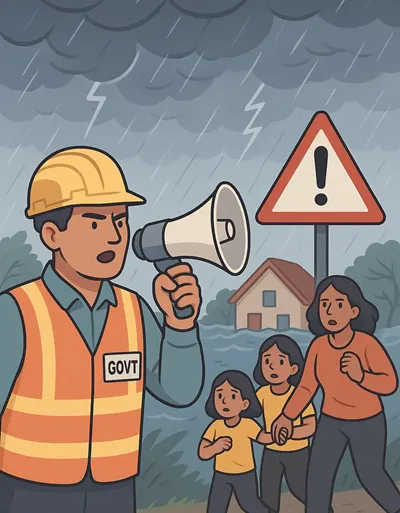
The Disaster Management Act, 2005 provides a legal framework for India to prepare for, respond to, and recover from disasters—both natural (floods, earthquakes, cyclones) and man-made (chemical spills, industrial accidents, pandemics). It defines the roles of national, state, and district authorities, establishes early warning systems, and empowers officials to take emergency measures, including lockdowns during pandemics.
The Act ensures a coordinated, organized, and effective disaster response across the country, safeguarding lives and property.
Key Highlights
- National Authority: NDMA, headed by the Prime Minister, guides national-level disaster preparedness and planning.
- State & District Authorities: SDMAs and DDMAs manage disaster preparedness, response, and recovery locally.
- Emergency Powers: Authorities can issue warnings, evacuate people, close public places, and enforce lockdowns.
- Risk Reduction: Early warning systems, community awareness, training, and preventive measures are prioritized.
- Relief & Rehabilitation: Focus on rescue, relief, medical aid, food, shelter, and rebuilding.
State-Wise Disaster Management Authorities
| State/UT | State Disaster Management Authority (SDMA) Website |
|---|---|
| Andhra Pradesh | https://apsdma.ap.gov.in/ |
| Maharashtra | https://sdma.maharashtra.gov.in/ |
| Karnataka | https://ksdma.karnataka.gov.in/en |
| Tamil Nadu | https://www.tn.gov.in/dept_profile.php?dep_id=MjY= |
| Gujarat | http://www.gsdma.org/ |
| Uttar Pradesh | https://upsdma.up.nic.in/ |
| West Bengal | https://wb.gov.in/departments-details.aspx?id=D171017163539655&page=Disaster-Management-and-Civil-Defence |
| Delhi | https://ddma.delhi.gov.in/ |
(Check local SDMA/DDMA portals for latest updates and guidelines.)
FAQs – Disaster Management Act, 2005
-
Q1. What is the Disaster Management Act, 2005?
-
A law enabling the government to prepare, respond, and recover from natural and man-made disasters efficiently.
-
Q2. What counts as a “disaster”?
-
Events causing loss of life, property, or disruption of normal life, e.g., floods, earthquakes, cyclones, chemical accidents, or pandemics.
-
Q3. Who is responsible for disaster management in India?
-
NDMA at the national level; SDMAs at the state level; DDMAs at the district level.
-
Q4. Who heads NDMA?
-
The Prime Minister of India is the Chairperson.
-
Q5. What do State Disaster Management Authorities (SDMAs) do?
-
Plan and coordinate disaster preparedness and response in their respective states under the Chief Minister.
-
Q6. What is the role of District Disaster Management Authorities (DDMAs)?
-
Handle local disaster response, relief, and preparedness. Headed by the District Collector or Magistrate.
-
Q7. What emergency powers do authorities have?
-
Issue warnings, evacuate areas, close public places, enforce lockdowns, and take necessary measures to save lives.
-
Q8. How does this law benefit citizens during disasters?
-
Provides rescue, food, shelter, medical care, and rehabilitation. Ensures organized government response.
-
Q9. What is the National Plan under this Act?
-
A guideline outlining disaster preparedness, prevention, and response at national, state, and district levels.
-
Q10. What if someone disobeys emergency instructions?
-
They can face fines or imprisonment under Sections 51–60 of the Act.
-
Q11. Did COVID-19 come under this Act?
-
Yes, the Act provided the legal basis for lockdowns, containment measures, and public safety norms.
-
Q12. Does this law focus on prevention as well?
-
Yes, through awareness campaigns, early warning systems, training, and risk reduction.
-
Q13. Can local communities participate in disaster management?
-
Yes, local bodies, NGOs, and volunteers can be actively involved in preparedness, awareness, and relief operations.
-
Q14. Why is the Act important?
-
It ensures India has a structured, legally-backed system to mitigate disasters, respond effectively, and protect citizens.
-
Q15. How are responsibilities divided among authorities?
-
NDMA handles policy and planning; SDMAs manage state-level coordination; DDMAs ensure local execution and response.
Add new comment